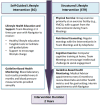Study design and methods: U.S. study to protect brain health through lifestyle intervention to reduce risk (U.S. POINTER)
- PMID: 37776210
- PMCID: PMC10916955
- DOI: 10.1002/alz.13365
Study design and methods: U.S. study to protect brain health through lifestyle intervention to reduce risk (U.S. POINTER)
Abstract
Introduction: The U.S. study to protect brain health through lifestyle intervention to reduce risk (U.S. POINTER) is conducted to confirm and expand the results of the Finnish Geriatric Intervention Study to Prevent Cognitive Impairment and Disability (FINGER) in Americans.
Methods: U.S. POINTER was planned as a 2-year randomized controlled trial of two lifestyle interventions in 2000 older adults at risk for dementia due to well-established factors. The primary outcome is a global cognition composite that permits harmonization with FINGER.
Results: U.S. POINTER is centrally coordinated and conducted at five clinical sites (ClinicalTrials.gov: NCT03688126). Outcomes assessments are completed at baseline and every 6 months. Both interventions focus on exercise, diet, cognitive/social stimulation, and cardiovascular health, but differ in intensity and accountability. The study partners with a worldwide network of similar trials for harmonization of methods and data sharing.
Discussion: U.S. POINTER is testing a potentially sustainable intervention to support brain health and Alzheimer's prevention for Americans. Impact is strengthened by the targeted participant diversity and expanded scientific scope through ancillary studies.
Keywords: Alzheimer's disease; aging; clinical trial; cognition; cognitive training; diet; exercise; lifestyle intervention; non-pharmacological; prevention; risk modification.
© 2023 The Authors. Alzheimer's & Dementia published by Wiley Periodicals LLC on behalf of Alzheimer's Association.
Conflict of interest statement
U.S. POINTER was conceived and developed in partnership with the Alzheimer's Association. Drs. Snyder and Carrillo, full‐time employees of the Alzheimer's Association, have contributed to the study design, trial oversight, manuscript preparation, and the decision to submit the article for publication. The authors have no conflicts to report. Author disclosures are available in the Supporting Information.
Figures
References
-
- National Academies of Sciences E, Medicine, Health, Medicine D, Board on Health Sciences P, Committee on Preventing D, Cognitive I . In Downey A, Stroud C, Landis S, Leshner AI, eds. Preventing Cognitive Decline and Dementia: A Way Forward. National Academies Press (US); 2017. - PubMed
-
- Committee on the Public Health Dimensions of Cognitive A, Board on Health Sciences P, Institute of M . The National academies collection: reports funded by National Institutes of Health. In Blazer DG, Yaffe K, Liverman CT, eds. The National academies collection: reports funded by National institutes of health. Cognitive Aging: Progress in Understanding and Opportunities for Action. National Academies Press (US); 2015. - PubMed
-
- Baumgart M, Snyder HM, Carrillo MC, Fazio S, Kim H, Johns H. Summary of the evidence on modifiable risk factors for cognitive decline and dementia: a population‐based perspective. Alzheimers Dement. 2015;11(6):718‐726. - PubMed
-
- WHO Guidelines Approved by the Guidelines Review Committee . In: Risk Reduction of Cognitive Decline and Dementia: WHO Guidelines. World Health Organization; 2019. - PubMed
Publication types
MeSH terms
Associated data
Grants and funding
LinkOut - more resources
Full Text Sources
Medical



